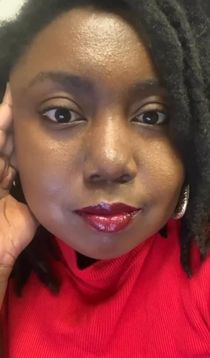
I’m not unlike most people who spend too many hours of my time scrolling through Tik Tok when I should be doing literally anything else. In my mind, however, it's justified -- as long as in between videos of dance challenges and gross food recipes, I watch videos about how to heal my gut, or listen to one of the many Black therapists on the app try and cure me of my people-pleasing ways.
There’s been an abundance of online content geared towards healing, within the last few years especially. Everywhere I turn, someone is tweeting about how to align your chakras or what combination of fruits in a smoothie will clear your skin or what hip stretches will release the trauma from my body.
It barely registers as odd to me now, since I began intentionally immersing myself in these online communities over the last year in an attempt to treat emotional and physical ailments. But sometimes, I am caught off guard by the ways in which healing has become a currency of sorts on social media.
As with anything that touches the timeline, there’s an opportunity to be rewarded with likes and retweets, and hoards of followers. There’s nothing inherently wrong with that, but it does leave the opportunity for attention to be allocated towards the glossiest, most idyllic version of life, which creates an environment of people trying to outdo one another.
There are hundreds of morning routines on Tik Tok where the creator takes over an hour to get ready as soon as they get up, from eating breakfast to exercising to journaling. There are healthy grocery hauls with over a hundred dollars worth of items. There are people who give their testimonies about manifesting themselves into a life of wealth and prosperity.
I watch all those videos the same way one might watch an animal documentary on National Geographic: with a morbid sense of fascination. I glean a few things from these videos that I’m able to transfer into my own daily life, but I can’t help but wonder what healing is supposed to look like for those that don’t have the lives that the people in these videos have.
When people talk about healing, it’s very individualistic and lacking in a racial and class analysis. It doesn’t take into account all the different systemic traumas that impact people on top of personal trauma.
How can one eat the food they need in order to repair their stomach if they live in a food desert? What does the morning routine look like for a person who is coming home from a night shift and has only a few hours in the morning to rest before going to another job? How does a person begin to heal in a world that constantly retraumatizes them because of their Blackness?
When western NGOs tried to help survivors of Rwandan genocide with individualized therapy in an indoor room, they were notably unsuccessful and in many ways were thought to have retraumatized the survivors. A Rwandan man described it like this:
“Their practice did not involve being outside in the sun where you begin to feel better. There was no music or drumming to get your blood flowing again. There was no sense that everyone had taken the day off so that the entire community could come together to try to lift you up and bring you back to joy. Instead they would take people one at a time into these dingy little rooms and have them sit around for an hour or so and talk about bad things that had happened to them. We had to ask them to leave.”
When I think about healing, I think of it as a collective effort. I think about the communities that grow gardens together and share the harvest. I think about the communities that have set up a public fridge for everyone to use. The grassroots organization that organizes mental health resources directly to under-resourced communities.
When we treat healing as solely an individual pursuit -- something that can be achieved through smoothie drinking and stretching -- we lose a necessary dimension that teaches us how to be a part of a whole; that allows us to lean on one another when life burdens us and lets us know we are not alone in our struggles.
There’s nothing wrong with applying facets of healing learned from people online or living vicariously through their daily routines that might be slightly unattainable. But the real healing begins when we learn how to do it together.
Read all of the stories in the Issa Rae: She Comes First editorial series here.
Let’s make things inbox official! Sign up for the xoNecole newsletter for daily love, wellness, career, and exclusive content delivered straight to your inbox.
- The Importance Of Healing After A Breakup - xoNecole: Women's ... ›
- The Healing Power Of Letting Go - xoNecole: Women's Interest ... ›
- I Tried Energy Healing, Guide - xoNecole: Women's Interest, Love ... ›
- 10 Black Podcasts About Healing You Should Be Listening To Now ... ›
- Meagan Good Divorce Healing Process - xoNecole: Women's ... ›


